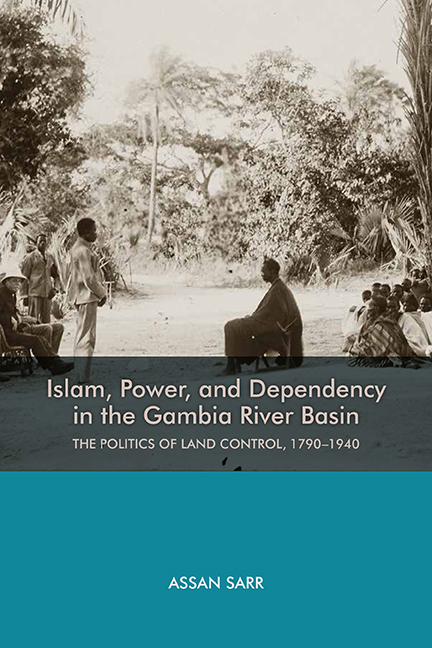Book contents
6 - The Politicization of Chieftaincy
from Part 2 - The End of the Old Order
Published online by Cambridge University Press: 26 April 2018
Summary
A New Generation of Chiefs
Sometime during the second half of the nineteenth century, an important family from the village of Katchang, in lower Baddibu, left to settle on land located along the Suwareh Kunda Creek on the Miniminiyang bolong. The town they founded was named Kerewan. However, the family kept ownership of its ancestral land in Katchang. They left the land under the custodianship of the alkalo of the village to rent out as he liked. The condition was that the alkalo and elders of Kerewan were always called in when a new alkalo “had to be appointed in Katchang.” When the newly appointed British traveling commissioner, J. H. Ozanne, chose a new alkalo in Katchang in 1893, the Kerewan alkalo sent his messenger to “approve the appointment” and put the new alkalo in charge of the Fatty lands. In accordance with local customs, the Fatty family had rights to that land and, it had to be returned if any member of the family demanded it.
As stated earlier, before the imposition of British colonial rule over the Gambia region and before militant jihadists succeeded in seizing power, prominent Mandinka families such as the Fatty of Katchang exercised more control over land. Also, when peanut production took off in the mid-nineteenth century, migrants who came to the Gambia region to grow peanuts rented land from local chiefs and families such as the Fatty, which by 1890 amounted to “three dollars (presumably per acre) or they gave a share of the crop or labor to their landlord.” But soon the practice of consulting the elders of the Fatty lineage on matters related to Katchang land was about to change. How did colonialism impact lower Gambian social and political arrangements around land control? What happened to the close link between chieftaincy and land control?
Colonial laws eroded chiefs’ and alkalos’ control over land, settlement, and taxes. They created ideas of communal ownership of land, and of ownerless land. By focusing on this important political shift, the chapter describes a post-Islamic transformation of land under the colonial regime. Once again, land was more than an economic resource; it was also relational and identity-laden.
- Type
- Chapter
- Information
- Islam, Power, and Dependency in the Gambia River BasinThe Politics of Land Control, 1790–1940, pp. 162 - 181Publisher: Boydell & BrewerPrint publication year: 2016

